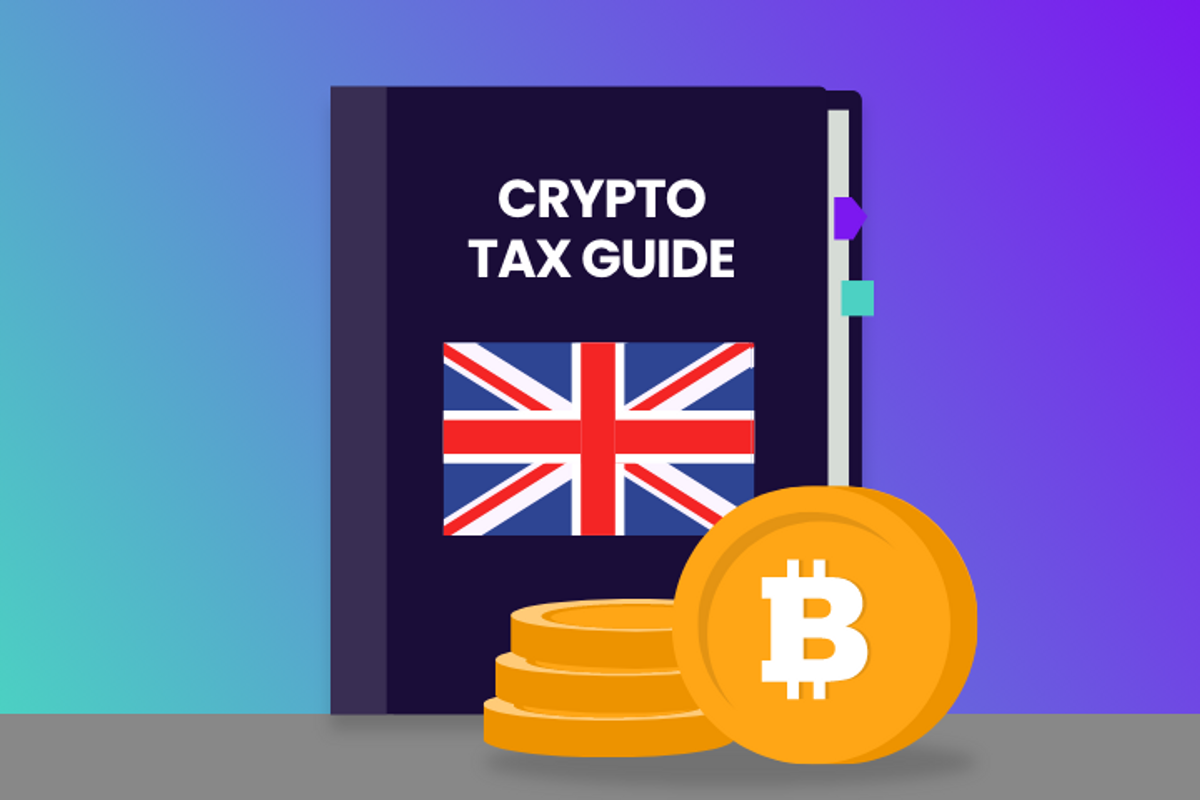
Many UK individuals are earning from crypto, not just from investing and trading but through passive income sources like mining, staking and airdrops. As these income streams grow in popularity, understanding how they’re taxed is becoming increasingly important. If you're earning income through crypto - whether actively or passively - HMRC has specific guidelines on when and how it should be taxed. In this guide, we’ll walk you through the basics of income tax, how it applies to crypto transactions, and what you need to know to stay compliant.
Disclaimer
This guide is intended as a generic informative piece. This is not accounting or tax advice that can be relied upon for any UK individual’s specific circumstances. Please speak to a qualified tax advisor about your specific circumstances before acting upon any of the information in this article.
What is income tax?
Income tax is a tax levied on the earnings of individuals. In the UK, this includes money from employment, self-employment, pensions, savings, and - relevant to us - certain types of income from cryptocurrency transactions. Not every type of crypto transaction is subject to income tax, but some are. The income tax you pay depends on how much you earn and your personal tax band.
How much income tax will I pay?
The amount of income tax you pay on your earnings depends on your total income for the year. In the UK, income tax is split into several bands. Your total earnings from all sources, including crypto, are used to calculate your tax band. You may find that your crypto income increases your total earnings to the extent that you are pushed into a higher tax rate.
UK income tax rates 2025/26
| Taxable income | Tax bracket | Tax rate |
|---|---|---|
| Up to £12,570 | Personal allowance* | 0% |
| £12,571 - £50,270 | Basic rate | 20% |
| £50,271 - £125,140 | Higher rate | 40% |
| Over £125,140 | Additional rate | 45% |
* The Personal Allowance goes down by £1 for every £2 that your adjusted net income is above £100,000.
The UK follows a progressive tax system meaning that the more income you make, the higher tax you pay. You do not pay a flat rate on all income based on your tax bracket; as you climb up the tax brackets your tax rate increases.
- income up to £12,570 is tax free, then
- income between £12,571 and £50,270 is taxed at 20%, then
- income between £50,271 and £125,140 is taxed at 40%.
Take a look at our article on UK tax rates for more detail.
HMRC trading income allowance
There is a £1,000 trading allowance for UK taxpayers, which applies to both miscellaneous income and financial trading income. This is an automatic tax exemption that does not need to be claimed.
If income is less than the trading allowance
If your total trading and miscellaneous income is less than £1,000 and you have no other self-employment, there is no tax to pay and nothing to declare to HMRC. If you already file a tax return, it is recommended to declare the income and use of the trading allowance, even where they net off to Nil taxable income.
The trading allowance cannot create a loss
For example, if the income is £600, you cannot deduct the £1,000 Trading Allowance and claim a loss of £400.
If income exceeds the trading allowance
If the trading and miscellaneous income is more than the £1,000 trading allowance, the individual can choose to simply deduct the £1,000 from their total income (with no deduction for expenses), or calculate the trading profit and net miscellaneous income under the normal rules (income less allowance expenses).
Self employed individuals
The trading allowance cannot be claimed against the cryptoasset trading or miscellaneous income if self-employed expenses are being deducted from any self-employed income.
How income tax applies to crypto transactions
HMRC treats crypto income in different ways. The tax applied to your crypto earnings depends on the type of income and the activity undertaken to generate it. Here’s a breakdown of the key categories:
Employment income
If you’re paid in crypto by your employer, the sterling equivalent at the date of receipt is taxable employment income, subject to income tax and national insurance contributions. Normally the cryptoassets used in employment income are Readily Convertible Assets (RCAs) meaning your employer can operate PAYE. Where this is not the case, or your employer is based outside of the UK, tax may become your responsibility.
You can find out more in our article Getting paid in crypto.
Miscellaneous income
Most crypto earnings, such as airdrops, staking rewards,and mining income (when it doesn't amount to a financial trade) are classed as "miscellaneous income".
Tax treatment on miscellaneous crypto income
The sterling value of the cryptoasset (at the time of receipt) should be reported as "Other Taxable Income" on the tax return, with any allowable expenses reducing the amount chargeable to tax.
Trading allowance and allowable expenses
Allowable expenses used in the income generating activity (such as additional electricity used in mining) can be deducted from the miscellaneous income. You can also apply the £1,000 trading allowance.
Losses on miscellaneous income
A loss under the miscellaneous income provisions can only be carried forwards to reduce future miscellaneous income from the same source.
Financial trading income
In exceptional circumstances, HMRC may classify some or all of your crypto activity as a form of financial trading income. This could be buying and selling cryptoassets, staking, mining or trading in cryptoasset derivatives. If this is the case, your profits would be taxed as self-employed business profits, subject to income tax and national insurance and the capital gains regime for buying and selling cryptoassets is not applicable.
Trading crypto is a common activity for crypto investors so it's easy to assume the financial trading rules apply to you, however the use of the term trade in this context is not sufficient to be regarded as a financial trade. In fact, being considered a financial trader is rare and only applies when trading activity is frequent and sophisticated.
Considering whether you are a financial trader is very complex and depends on your cryptoasset activity and individual circumstances. In our article financial trading in cryptoassets we explore the key areas that HMRC will consider when establishing if an individual is a financial trader or not.
Tax treatment on crypto financial trading income
Income Tax and National Insurance will be applied to their business trading profits. The trading income is the sterling equivalent (on the date of receipt) of the cryptoassets received.
You will need to be registered as a sole trader business with HMRC for Self Assessment and file tax returns. We recommend seeking the advice of a qualified tax professional before registering your cryptoassets trading business with HMRC to check that this is the appropriate action.
Trading allowance and allowable expenses
You can apply the £1,000 trading allowance to financial trading income and allowable expenses. The allowable trading expenses (under the normal income tax rules for businesses) are deducted from the receipts to calculate a trading profit or loss. The tax rules for running your own business are complex and although the HMRC Business Income Manual provides lots of guidance about the kind of expenses that can be deducted, we recommend getting advice from your accountant to ensure which apply for your crypto activity.
Mining electricity and equipment
Under normal business expense principles, the cost of additional electricity used in order to mine and capital allowances on the mining equipment used should be allowable expenses, but HMRC are not clear, so we recommend consulting a tax professional for clarification.
Capital gains tax on subsequent disposals
Unfortunately, when you eventually dispose of your earnings they will also be subject to capital gains tax. The sterling market value at the date of receipt is the capital gains tax acquisition cost and your gain or loss depends on the change in value since acquisition and the application of the share matching rules. Find out more in our capital gains article.
Take a look at our UK crypto tax guide for more information about how cryptocurrency is taxed.
Calculating income tax on crypto
To calculate how much crypto income tax you owe, follow these steps:
- Calculate your crypto earnings: Identify the sterling value of your crypto income at the time of receipt (staking rewards, mining profits, or crypto earned through employment).
- Deduct allowable expenses or the trading allowance: (if eligible and you choose to deduct this instead of actual expenses).
- Determine your total income: Add up all your income from various sources (employment, crypto, etc.).
- Deduct your personal allowance: If you earn less than £12,570, you won’t pay income tax. Earnings beyond this are taxed according to the tax bands.
- Apply the correct tax rate: Based on your total income, use the tax rates we mentioned earlier to see how much tax you owe.
You can find out more about calculating income tax and explore different UK tax rates in our article "How to calculate your crypto taxes".
How to report crypto income to HMRC
Your crypto income should be reported and paid as part of HMRC’s Self Assessment Tax Return. The section you'll need to fill in depends on the type of income tax...
Crypto miscellaneous income
You can fill in miscellaneous income on Box 17 for ‘Other taxable income’ on the SA100 form with allowable expenses reported in Box 18.
Crypto employment income
How to declare and pay tax on crypto employment income to HMRC depends on whether the assets you receive are ‘readily convertible assets’.
RCA’s
- If you receive an RCA and your earnings are taxed via PAYE, there is no need to file a tax return (unless you meet other criteria).
- If you receive RCAs and your employer is not UK based then you should operate PAYE and pay tax and National Insurance each time you are paid.
- Where you need to file a tax return for other reasons you need to report the gross employment income and tax deducted via PAYE on the employment pages. You can find this information on your P60.
Non RCA’s
If the cryptoassets you receive are not RCA’s then you will need to report them on the employment pages of the tax return. If you are not already filing a self assessment you will need to register to do this.
Financial trading income
If your crypto activity is classed as financial trading, you can declare this on the Self-employed pages of the tax return (SA103). You’ll need to enter your turnover for the tax year and expenses. If the income is below £85,000 you can enter your total expenses, if income is over £85,000, you’ll have to enter individual amounts for each type as well.
HMRC trading allowance
If you claim the £1,000 tax-free trading allowance, you cannot claim expenses.
Common mistakes to avoid when calculating and reporting income tax on crypto
Some of the common mistakes that can occur with income tax for crypto activity.
- Record keeping: failing to accurately track and record transactions, makes tax filing difficult, so stay on top of incoming payments.
- Tax treatment: misinterpreting the tax treatment of crypto activities, such as staking or airdrops can lead to misreporting or overlooking them when filing.
- Failing to report all transactions: due to a lack of awareness or mistaken belief that not all transactions are taxable, can lead to significant penalties. Don’t forget that taxable crypto income is also subject to normal capital gains tax when later disposed of too.
- Deducting allowable costs: ensure you deduct all allowable expenses to lower your tax liability as much as possible, for crypto this can be hard to navigate so checking what costs are acceptable with your accountant is advised.
- Calculation errors: whether it’s user error or confusion of the tax rules, mistakes can result in inaccurate tax reporting and potential disputes with HMRC.
- Reporting financial trading income: many crypto traders assume that their activity is classed as financial trading, which can lead to a higher tax bill unnecessarily. Take a look at our <article> or check with your accountant for clarification on your tax position.
How Recap can help with crypto income tax
Our crypto tax software, automates crypto record keeping and taxes. Simply connect your crypto accounts and wallets or upload CSV transaction data and the software calculates your income tax and capital gains for every tax year where you have taxable transactions.
- The Recap Income report provides details of all the cryptoasset income to include on your Self Assessment Tax Return.
- The Recap CGT pdf report provides a summary of all the relevant information needed for the capital gains section of the tax return. You can also attach the disposals report to detail.
Key takeaways: crypto income tax
- Income tax is applicable to income received from crypto activity such as mining and staking rewards as well as employment income.
- You should carefully track the fair market value of any cryptoassets on the date of receipt to accurately calculate income taxes.
- Depending on the activity and circumstances, income tax may be reported and paid through PAYE, or on the Self Assessment Tax Return as Other Taxable Income or the Self-employed pages.
- You may be required to pay income tax, or income tax and national insurance on your crypto earnings.
- Certain allowable costs and the £1,000 trading allowance may sometimes be applied to lower the tax burden.
- Common mistakes, such as failing to maintain accurate records or misunderstanding the tax treatment of specific activities, can lead to significant tax liabilities and potential penalties.
- Seeking tools or guidance of tax professionals can help simplify crypto tax calculations and ensure compliance.


